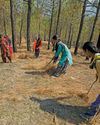
IN 2022, we took a pledge to remove poverty from our village by 2030 and ensure employment of all residents. With our efforts, women in the village now work with self-help groups, while men earn through self-employment schemes," says Vinayak Gaikwad, sarpanch of Khandobachi Wadi, a village in Maharashtra Sangli district. In 2023, the National Panchayat Performance Assessment Committee awarded the village the first prize under "Poverty free and enhanced livelihoods" category. The award allows the panchayat to undertake works worth up to 1 crore in the village.
These were India's first National Panchayat Awards and will be an annual feature. The official dashboard of the panchayat awards says that its primary aim is "to assess the performance" of panchayats in meeting the UN's 17 Sustainable Development Goals (SDGs) for 2030.
India has been chasing SDGS since the UN adopted them in 2015. To this end, the Niti Aayog releases an SDG Index Report every year since 2018. But in 2019, the country's apex public policy think tank asked the government to focus on Localisation of Sustainable Goals (LSDG). The task went to the Union Ministry of Panchayati Raj. In May 2021, the ministry set up a highpower committee, which submitted a report in October 2021. The report forms the basis of the awards.
Acting on the report, the ministry divided the 17 UN SDGS into nine themes, while also incorporating the 29 panchayat subjects under the XIth Schedule of Constitution of India (see 'Thematic integration').
The ministry then asked villages to prepare their Gram Vikas Panchayat Plan (GPDP) on the basis of nine themes. The top three panchayats are awarded in each category.
This story is from the {{IssueName}} edition of {{MagazineName}}.
Start your 7-day Magzter GOLD free trial to access thousands of curated premium stories, and 9,000+ magazines and newspapers.
Already a subscriber ? Sign In
This story is from the {{IssueName}} edition of {{MagazineName}}.
Start your 7-day Magzter GOLD free trial to access thousands of curated premium stories, and 9,000+ magazines and newspapers.
Already a subscriber? Sign In

THE CIRCULARITY ARGUMENT
A circular economy can help India achieve its developmental aspirations while following the low-carbon pathway. It will also help address the challenges of waste management, pollution and overexploitation of natural resources. Industries are already innovating to reuse high-volume wastes and have shown that the transition can usher in both environmental and financial windfalls

Banking on flawed drug voluntary licences
The Medicines Patent Pool is pushing for more VLs, but its bad deal with Novartis on a cancer drug shows the pitfalls

Lasting solutions
For the first time, the UN has recognised the role of indigenous communities in tackling aridity. A repository of traditional knowledge India has the wherewithal to lead the way

IMD at 150
India's journey into modern weather forecasting took a decisive turn 150 years ago with the establishment of India Meteorological Department during the British rule. The agency has come a long way since then, shaping the way the country predicts and responds to its diverse climate challenges

Every drop counts
In drought-prone Marathwada region, 14 villages have managed to counter water shortage by budgeting the resource

Threat to survival
Hollongapar Gibbon Sanctuary in Assam faces ecological challenges as railway electrification and hydrocarbon exploration endanger its fragile biodiversity

'Migration is going to be a battlefield'
AMITAV GHOSH is one of the foremost chroniclers of our times. His literary sojourn includes writings on topics that range from languages to climate change to human lives. His latest book, Wild Fictions, brings some of his works on these issues under one title. In a conversation with RAJAT GHAI, Ghosh shares his views on the future of human movement. Excerpts:

Face of future
California wildfires confirm forest fires are intensifying in a hotter world, emitting substantial amounts of greenhouse gases and reinforcing global warming

Friends of the forest
Residents of 30 villages in Uttarakhand establish a model for public participation in saving forests from wildfires

Climate-crazy playbook
Just hours after his second (and final) term began on January 20, US President Donald Trump unleashed 46 presidential actions. Several of these are centred on the US' climate commitments, energy transition, migration and trade policies, and are likely to have negative global implications